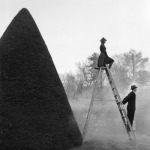
The first year went by in a blur. A few signs of optimism. A lot of anxiety. But through it all we really did act locally and think globally.
We had hired David Brixton, a very talented editor from London and convinced him and his wife Jemma of our dream. They moved to Chicago and brought European flair, creative credibility, a work ethic that matched ours and extraordinary social sensibility.
Chris and I were never comfortable in big crowds. But we knew we were powerful in small intimate social settings. So we started inviting potential clients to our home for dinner. I can honestly say we never invited any one we didn’t already like. But we made the effort consciously. As Woody Allen says, though not as often as I repeat it, “ninety percent of life is just about showing up.” We found a way we could show up that was comfortable to us.
The business grew. We advertised nationally and acted as though we were who we wanted to be. “They became what they beheld” is another quote we lived by. Quotes are micro philosophies. I’m a fan of both.
Things were good and getting better. But, we knew we were never going to be ‘the best editing company in the world’ (“tbecitw”) sitting in Chicago. So we asked David and Jemma if they would consider moving to Los Angeles.
A quick contract renegotiation later - LA is very much more expensive than Chicago - we opened a small office in Santa Monica, and threw the resources of our small but growing company behind them. (Ultimately we came to establish formal cost of living factors in all four of our offices so we had a transparent and fair foundation for all employee moves).
We didn’t discriminate based on where an opportunity came from. We simply allocated resources to support it. We developed proprietary information systems that supported both offices seamlessly, established a philosophy for travel policies so we could manage costs and expectations pro-actively, and then added technology to support our commitment to ‘fluidity’ - a catch phrase I adopted to define our method and our expectation both internally and publicly.
We made many, many decisions based on whether they made us more or less ‘fluid’ as a company. And if you look at the Whitehouse to this day, you’ll see fluidity coursing through its veins.
We gained local traction in LA thanks to having smart and committed people on the ground who embodied our original philosophy, and then added their own personality and experience to bring it to life. We got better work, attracted more attention and then reached the tipping point with the addition of two significant local talent, film editor Livio Sanchez and Executive Producer Sue Dawson. They both agreed to join us on the same day. It was the day I knew we had reached a new level.
Two years later Livio edited the original “Whassup” campaign for Budweiser on the back of his passion for the short film on which the work was based and on my personal relationship with the agency producer in Chicago. “Whassup” infiltrated every home in the Western hemisphere and won the Grand Prix at the Cannes Advertising Festival as the best commercial in the world that year.
We had arrived.



















